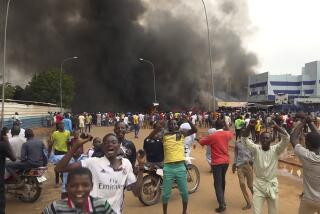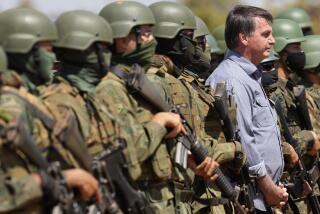Egypt protesters tend to put faith in army
- Share via
Reporting from Cairo — As Yousef Ahmed, a 25-year-old protester, marched along a riverfront boulevard Saturday, a soldier atop one tank extended an arm and helped him climb aboard. They embraced and posed for a picture.
“He’s my cousin,” Ahmed said, laughing. He said he has 10 other relatives serving in the military. “I asked him if the army had orders to attack us. He said, ‘You’re family. How can we harm our family?’”
In stark contrast to the ugly clashes between Egyptian police officers and protesters, the nation’s soldiers were greeted like rock stars when they moved into Cairo’s restive streets.
Demonstrators parted to allow tanks to roll in. They swarmed around military vehicles to shake soldiers’ hands and exchange hugs. They offered food and water.
“The people and the military are one hand!” was a popular chant.
As Egypt’s crisis unfolds, the army is likely to play a pivotal role. Throughout the country’s recent history, political change has most often come through military coups. Although President Hosni Mubarak, a former military officer, is thought to enjoy the strong backing of top generals, the sympathies of many in the lower ranks seemed to rest squarely with protesters.
Some demonstrators expressed hope that the military would oust Mubarak and seize control of the government, replacing the Interior Ministry’s widely unpopular police force.
“We want the military to take over,” said Mohamed Ismay, 30, a house painter standing in front of a group of soldiers. “The military is fair and they stand with the people. The Interior Ministry tortures us. They imposed emergency law and arrest people all the time.”
But Iman Zaki, 43, an engineer, warned against placing too much faith in the military.
“We don’t want to replace one dictator with another,” he said. “We want a real democracy.”
Experts said the goodwill between the army and the people stems largely from the fact that the military has rarely been called upon to cope with civilian unrest. That could change now. Incidents of looting and robbery began to multiply Saturday after a government decision to withdraw most police officers.
“Protesters and the army are starting with a clean slate,” said Hossam Bahgat, executive director of the Egyptian Initiative for Personal Rights, a human rights group in Cairo. “There is no history of animosity. It’s like a first date where both sides are trying to set the terms of the relationship.”
So far, demonstrators appear to be eager to avoid confrontations with the army.
But Zaki, the engineer, was skeptical about how long the goodwill would last: “If they get the orders, we really don’t know yet what their reaction is going to be.”
More to Read
Sign up for Essential California
The most important California stories and recommendations in your inbox every morning.
You may occasionally receive promotional content from the Los Angeles Times.













